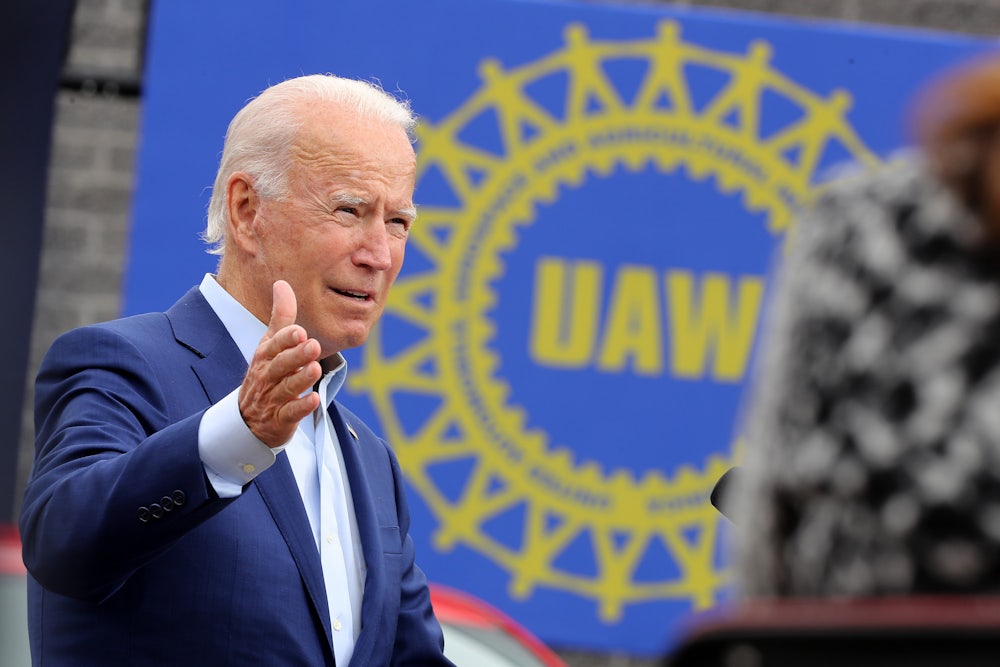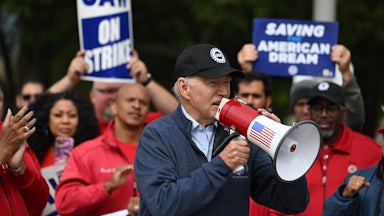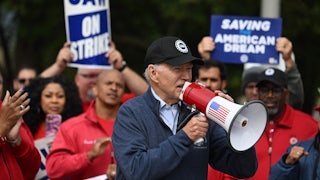There’s a lot going on in the world, and most of it pretty grim. So let’s not look past the one piece of unqualified recent good news, and the larger economic meaning and possible political impacts of this news for 2024.
The United Auto Workers have signed historic deals with two of the “Big Three” automakers—Ford and Stellantis (the union reached a tentative deal with General Motors on Monday morning, after this article was published).* The deals, after a mere six weeks on strike, are overwhelmingly favorable to workers: a 25 percent raise over four years (think of that—an average of 6.25 percent a year, about double the current inflation rate); the top wage would take highest-paid workers from $67,000 to $83,000 before overtime; possible cost-of-living adjustments on top of the 25 percent; the end of the tiered wage system; and more.
And it wasn’t just wages. Consider this. Stellantis had temporarily shut down a plant in Belvidere, Illinois, late last year, eliminating some 1,350 jobs. With this deal, Stellantis is not only reopening the plant—it’s expanding it by adding a battery plant to the operation. Things like that are going to be happening all over auto-producing states.
These are terrific agreements and huge wins for labor. And they ought to be big wins for somebody else too.
Could the UAW have won these deals without Joe Biden? I’m sure it could have—it came to the picket line with a great case to make. The automakers know that they’ve been making record profits in recent years—about $250 billion in North America over the last decade. They also know that the UAW has a president in Shawn Fain who is smart and aggressive, and that the union was sitting on an $825 million strike fund that would have allowed striking workers to stay out for months. The automakers also know that public opinion is not on their side—in one mid-October poll, 36 percent of respondents backed the workers while only 9 percent supported the bosses.
All those facts augured a union win. Fain, by all accounts, is a truly dynamic leader. He won the presidency earlier this year, defeating the incumbent in a runoff by a mere 500 votes. Which is to say, he had no special mandate to be this aggressive heading into these negotiations. He really rolled the dice here and got the rank and file behind him in a big way.
So most of the credit clearly goes to him and his team. But the automakers also had the president of the United States walking the picket line and declaring himself more unambiguously on the side of the workers than any president has done in my lifetime. Biden’s public display of allegiance to their union was surely reinforced by private signals the administration sent out to both sides.
This was the most dramatic presidential intervention in a private-sector strike since … well, if there was a precedent for it, I can’t recall it. But I do know this: Biden’s timely show of support was just about the only one I can think of where a sitting president so openly sided with labor in such a dispute. In fact, when Harry Truman—who is usually mentioned in columns such as this one in sentences that read: “Biden is the most pro-labor president since Harry Truman”—intervened in a wave of 1946 strikes, he did so against the unions. He even took the United Mine Workers to court.
There are two lessons here. The first is economic: Forcing companies that are making record profits to quit spending those profits on stock buybacks and share them with the workforce is at the very heart of middle-out economics—or Bidenomics, if you prefer. Middle-out economics (and hey, there’s a good recent book on this by a guy I know quite well!) proceeds from the idea that the economy grows best not through giving more money back to those at the top but through investing in the middle and working classes. It is thus an alternative theory of growth to the right’s theory of supply-side or trickle-down economics.
This is important. It’s a theory of growth. That’s something even a lot of liberals don’t understand, because when liberals think about the economy, they often think first of fairness. And that’s a big part of the reason why, in poll after poll, Americans say they trust Republicans to handle the economy more than they trust Democrats, even though the historical numbers show that the economy has performed far better during Democratic presidencies than Republican ones in the past 60 years (even Donald Trump believed this before he entered politics as a Republican).
Fairness matters to liberals, but let’s face it, it matters less to everyone else. Other people prioritize growth. That’s why Democrats should be talking about economic expansion too. Middle-out economics is a theory of growth—and, as it happens, of far more equitable growth than trickle-down economics. In this way, the idea of fairness remains baked into the argument. But Democrats don’t even need to say that part (well, except I guess in front of Democratic audiences who want to hear it).
The economy right now is growing quite well. Gross domestic product grew at an annual rate of 4.9 percent in the third quarter of 2023. Even Forbes called that “red hot.” It outpaced expectations by nearly a half a percent. Trump’s best quarter, in terms of GDP, was 3.3 percent; Barack Obama’s was 3.8 percent.
I don’t want to draw direct lines from Biden’s policies to one quarterly GDP number. What’s red hot today is bound to cool off tomorrow, and the GDP is naturally expected to fall again this quarter after hitting this high. Meanwhile, there remains talk of a possible recession next year—although those predictions have gotten much more tempered after the hair-on-fire declarations of impending doom that filled the business press in the last year or so. Even where those fears remain, many of those hinting at a possible downturn think it will be short-lived and not severe.
But here’s a self-evident truth about the way Biden views the economy. We have a president who takes seriously the fundamental economic fact of American life of the last 40 years, which is that trillions of dollars of wealth have been transferred from the lower and middle classes to the top 1 percent, and even to the top 0.1 percent. Moreover, it’s rivetingly clear that he thinks that it’s long past time to get that river flowing in the other direction.
He deserves way more credit for this than he’s been getting. The UAW has not endorsed Biden yet, and Trump of course will campaign heavily in the Rust Belt states claiming to be the working-class’s warrior chief. But it’s Biden who has been delivering.
The negotiations aren’t over. GM still hasn’t settled. And, of course, the members still have to ratify the agreements.
But assuming no major hiccups on those fronts, we’re looking at an event that literally could turn the tide of history for labor in America, from the story of labor’s retreat that has obtained for the last 40 or more years to one of resurgence, progress, and victory, with the resultant transfer of both wealth and political power from corporations back to workers. It’s no accident that it’s happening while Joe Biden is in the White House.
People can complain about his age, and there are probably major fights coming within the Democratic coalition over Israel-Palestine. Both of those things are legitimate issues. But I also know this to be true: There’s a general liberal diffidence toward Biden that he doesn’t deserve. On most aspects of domestic policy, on making the United States stand for the correct principles in Ukraine, and especially on class politics, he’s been absolutely right.
Conservatives, having no policy agenda, can’t be disappointed in their leaders’ lack of passing big legislation. They’re against big legislation! They mainly just want their leaders to pick fights with, and flick rhetorical acid at, the perceived destroyers of America.
Liberals, in contrast, have an abundant policy agenda, so they live in a constant state of disappointment. That’s fine; it’s who we are. But we have to recognize this reality and not allow it to curdle into indifference, especially next year, when liberal indifference will mean the end of American democracy.
These economic ideas are getting unique support from this administration, in ways that rewrite the Democratic Party’s approach to delivering both growth and fairness to workers who have long gone without this level of support. Here, surely, Joe Biden deserves a little love.
* This article has been updated.










